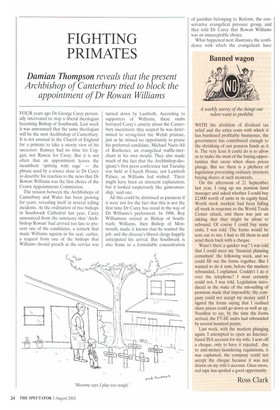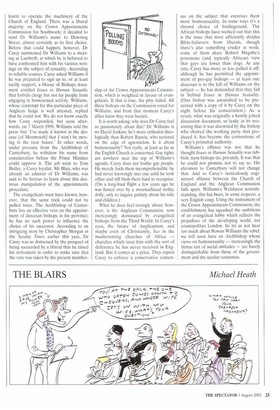FIGHTING PRIMATES
Damian Thompson reveals that the present
Archbishop of Canterbury tried to block the appointment of Dr Rowan Williams
FOUR years ago Dr George Carey personally intervened to stop a liberal theologian becoming Bishop of Southwark. Last week it was announced that the same theologian will be the next Archbishop of Canterbury. It is not unusual in the Church of England for a primate to take a snooty view of his successor: Ramsey had no time for Coggan, nor Runcie for Carey. But it is not often that an appointment leaves the incumbent 'spitting with rage' — the phrase used by a source close to Dr Carey to describe his reaction to the news that Dr Rowan Williams was the first choice of the Crown Appointments Commission.
The tension between the Archbishops of Canterbury and Wales has been growing for years, revealing itself in several telling incidents, At the ordination of two bishops in Southwark Cathedral last year, Carey announced from the sanctuary that 'Archbishop Rowan' had arrived too late to present one of the candidates, a remark that made Williams squirm in his seat; earlier, a request from one of the bishops that Williams should preach at the service was turned down by Lambeth. According to supporters of Williams, these snubs betrayed Carey's anxiety about the Canterbury succession: they suspect he was determined to wrong-foot the Welsh primate, just as he missed no opportunity to praise his preferred candidate, Michael Nazir-Ali of Rochester, an evangelical waffle-merchant in his own mould. They also made much of the fact that the Archbishop-designate's first press conference last Tuesday was held at Church House, not Lambeth Palace, as Williams had wished. 'There might have been an innocent explanation, but it looked suspiciously like gamesmanship,' said one.
All this could be dismissed as paranoia if it were not for the fact that this is not the first time Dr Carey has stood in the way of Dr Williams's preferment, In 1998, Roy Williamson retired as Bishop of Southwark; Williams, then Bishop of Monmouth, made it known that he wanted the job, and the diocese's liberal clergy happily anticipated his arrival. But Southwark is also home to a formidable concentration of parishes belonging to Reform, the conservative evangelical pressure group, and they told Dr Carey that Rowan Williams was an unacceptable choice.
What happened next illustrates the confidence with which the evangelicals have learnt to operate the machinery of the Church of England. There was a liberal majority on the Crown Appointments Commission for Southwark; it decided to send Dr Williams's name to Downing Street, almost certainly as its first choice. Before that could happen, however, Dr Carey summoned Dr Williams to a meeting at Lambeth, at which he is believed to have confronted him with his various writings on the subject of sexuality. According to reliable sources, Carey asked Williams if he was prepared to sign up to, or at least tacitly support, a House of Bishops document entitled Issues in Human Sexuality that forbids clergy but not lay people from engaging in homosexual activity. Williams, whose contempt for this particular piece of Anglican fudge is well attested, replied that he could not. We do not know exactly how Carey responded, but soon afterwards, on 7 March 1998, Williams told the press that 'I've made it known in the diocese [of Monmouth] that I won't be moving in the near future.' In other words, under pressure from the Archbishop of Canterbury, he withdrew his name from consideration before the Prime Minister could approve it. The job went to Tom Butler, a Carey loyalist. Mr Blair, who was already an admirer of Dr Williams, was said to be furious to learn about this dextrous manipulation of the appointments procedure.
The evangelicals must have known, however, that the same trick could not be pulled twice. The Archbishop of Canterbury has an effective veto on the appointment of diocesan bishops in his province; he has no such power to influence the choice of his successor. According to an intriguing story by Christopher Morgan in the Sunday Times earlier this year, Dr Carey was so distressed by the prospect of being succeeded by a liberal that he timed his retirement in order to make sure that the vote was taken by the present member ship of the Crown Appointments Commission, which is weighted in favour of evangelicals. If that is true, the ploy failed. All three bishops on the Commission voted for Williams, and from that moment Carey's allies knew they were beaten.
It is worth asking: why does Dr Carey feel so passionately about this? Dr Williams is no David Jenkins; he's more orthodox theologically than Robert Runcie, who teetered on the edge of agnosticism. Is it about homosexuality? Not really, at least as far as the English Church is concerned. Gay rights are nowhere near the top of Williams's agenda. Carey does not loathe gay people. He merely finds them incomprehensible: he had never knowingly met one until he took office and still finds them hard to recognise. (On a long-haul flight a few years ago he was fussed over by a moustachioed trolley dolly, only to inquire politely about his wife and children.)
What he does feel strongly about, however, is the Anglican Communion, now increasingly dominated by evangelical bishops from the Third World. In Carey's eyes, the future of Anglicanism, and maybe even of Christianity, lies in the mushrooming churches of Africa — churches which treat him with the sort of deference he has never received in England. But it comes at a price. They expect Carey to enforce a conservative consen
sus on the subject that exercises them most: homosexuality. In some ways it's a shrewd choice of battleground. The African bishops have worked out that this is the issue that most efficiently divides Bible-believers from liberals, though there's also something cruder at work: some of them share Robert Mugabe's poisonous (and typically African) view that gays are lower than dogs. At any rate, Carey has more or less pulled it off: although he has permitted the appointment of pro-gay bishops — at least one diocesan is to the left of Williams on the subject — he has demanded that they fall in behind Issues in Human Sexuality. (One bishop was astonished to be presented with a copy of it by Carey on the night before his consecration.) As a result, what was originally a hastily jotted discussion document, so leaky in its reasoning that it was disowned by the bishop who chaired the working party that produced it, has become the cornerstone of Carey's primatial authority.
Williams's offence was not that he thought Issues in Human Sexuality was rubbish: most bishops do, privately. It was that he could not promise not to say so. His elevation to Canterbury will not change that. And so Carey's meticulously engineered alliance between the Church of England and the Anglican Communion falls apart. Williams's Welshness notwithstanding, this has been, in some respects, a very English coup. Using the instrument of the Crown Appointments Commission, the establishment has squashed the ambitions of an evangelical lobby which reflects the prejudices of the developing world, not cosmopolitan London. So let us not hear too much about Rowan Williams the rebel: we will soon have an Archbishop whose views on homosexuality — increasingly the litmus test of social attitudes — are barely distinguishable from those of the government and the secular consensus.



























































 Previous page
Previous page